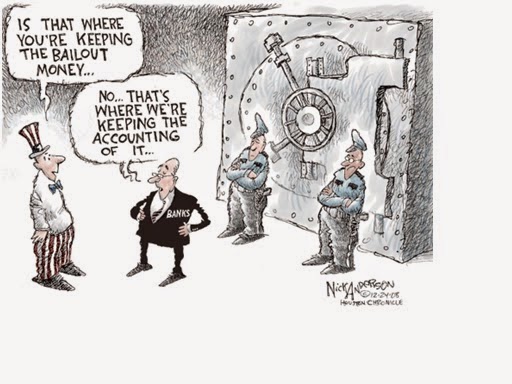Harsh Truths about Laissez-faire (Free Trade).
Business Philosophy of the WASPs
WASPs expand as “White Anglo Saxon Protestants”, neither a
religious nor an ethnic group but a business culture of the Western Europe that
encourages innovation, exploration and passion for achievement and growth. They
prefer a strong capitalism with least interference from the government. Armed
by two ideologies, democracy and Laissez-Faire (‘let do and let pass’ meaning
deregulated free trade), world economy has been under their direction for the
last 400 years. It is empowerment of the corporate sector to run the economy.
Anglo Saxon governments, generally well organized, provide political and military
support to their businesses under any circumstance - and at all levels - to
secure their interest and domination in world commerce/industry/trade. The USA stands as an extreme example of pure
Laissez-faire.
The strong belief in
Anglo-Saxon economies is to create and keep increasing shareholder/owner’s
value. The survival
and success of the CEOs depend only upon their ability to maximise it. In
recent years financial experts capable of
manipulating figures and play in
speculative deals are preferred as CEOs.
Economic approach in the rest of the world is more after
equality than wealth. Stake holders (employees, creditors, customers,
government and public) are respected as partners in progress and not viewed as
an unavoidable burden. It l has a social quality and social nets so that
workers are not being reduced to cost factors. Anglo Saxons strongly believe
that liberalised economies welcoming foreign capital and skilled labour produce
greater overall prosperity, while the others counter argues that regulated
economy will produce lesser inequality and lesser poverty at the lowest
margins.
WASP philosophy strongly advocates self reliance and initiative.
During the great economic depression in 1929, the Anglo Saxon pundits advised
that Government charity, especially robbing people of initiative, would be a
great error. President Herbert Hoover
warned that American people should not look for help from the Federal Treasury
even during national crisis as it might become a practice in future. When there
was vociferation that 600 families control and enjoy the wealth of America, he
said “confiscation
of wealth may satisfy the vengeful in us and may soothe a retaliatory spirit.
But it is the path of national suicide. Objectives of planned economy should
not be made to depend upon popular decision.
Planners must control the people and be vested with full authority.”
Many government regulations introduced
under the New Deal progamme to revive the economy after the depression was removed
when normalcy returned.
It supports national
businesses against foreign competition and restrictions but will be unmerciful
if they run into trouble. Bank failures
in the USA are very common and the FDIC’s statistics reveal 3560 bank failures
since 1934. Many prominent
multinationals of yester years ( Pan-Am, Chrysler, Chase Manhattan Bank) had
disappeared or have lost their identity. Both share and stake holders are
expected to manage their risk and protect them from failures as there will be minimal
government interference.
“They should pay for their irrational exuberance”, cried the
conservatives who opposed the US government efforts to bail out the scandalous big fish like Citicorp, AIG,
Goldman Sachs and a few others during
the 2008 financial crisis. The US
Congress approved a rescue package of 700 billion dollars as a temporary cure
for the crisis because of its contagion impacts, but made it clear that it will
not set a precedent for a government bailout in future. A few corporations who availed of the rescue
funding have already repaid part amount.
http://www.shiftfrequency.com
The US government operates like a business house. Extreme steps such as shutting down the
functions of the Government like an industrial lock out are common. President Obama shut down the Federal
government for 16 days in Oct/2013 when the Congress refused to provide extra
funds to run the government. Eight government
shutdowns were recorded in the last 40 years. Detroit city was declared bankrupt
in 2014 due to lack of funds. These actions will never take place anywhere in
the rest of the world. Hire and fire
policy is widely practiced with no exception even to top ranking CEOs. Unceremonious sacking of Vikram Pundit, CEO of
CitiGroup who rescued it from bankruptcy is the recent example.
Will this philosophy which religiously follows the Darwin’s
theory of “Survival of the fittest” fly in India?
The hangover of government control and support is still
strong among the public. This
philosophy will be disliked by politicians as it will put a stopper into their
personal and party kitty. A decade ago, India was under heavy pressure from the
West to liberalise its banking sector. Nobel laureate Joseph Stiglitz complimented
India for resisting pressure to deregulate. She was able to maintain her economic balance during
the global turmoil in 2008, thanks to the stubbornness of the then RBI Governor
Dr.Y.V. Reddy. Hasty deregulations by
aping the USA will only complicate the system and make corruption totally
untenable as our law enforcement machinery
is weak.
“Inclusive growth”, the recent Mantra adored y India, is
diametrically opposite to Laissez –faire. Many sops under this programme are aimed to
capture vote banks. The word ‘inclusive’ has a complex meaning and dimension in
India, not just confined to economic backwardness. Inclusive Growth may temporarily reduce
inequality but will add more to the prevailing lethargy and will be counterproductive
in the long run. India is still confused
about a suitable economic model. Many of her policies have become ineffective
due to cutting a middle path to satisfy everyone. India is a typical middle path monger.
Anglo Saxons will gun down a limping horse but Indians will
not.
Although successful and admired, pure laissez-faire is a
misfit for a soft and developing country like India where stakeholders prevail
over shareholders. It can have only an information value in economics text
books. India needs fair trade not the Anglo Saxon style of free trade.
Dr. Krishnan Arunachalam
Ref: The
Great Depression by Don Nardo
www.wikipedia.com
(Published in Mylopore Club Magazine Mar/2015)





